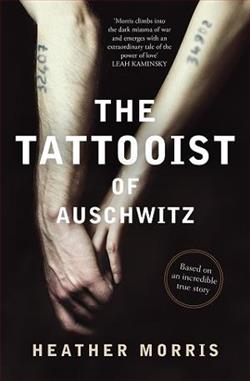
The Tattooist of Auschwitz
by Heather Morris
The Tattooist of Auschwitz is based on the true story of Lale and Gita Sokolov, two Slovakian Jews who survived Auschwitz and eventually made their home in Australia. In that terrible place, Lale was given the job of tattooing the prisoners marked for survival—literally scratching numbers into his fellow victims’ arms in indelible ink to create what would become one of the most potent symbols of the Holocaust. Lale used the infinitesimal freedom of movement that this position awarded him to exchange jewels and money taken from murdered Jews for food to keep others alive. If he had been caught, he would have been killed; many owed him their survival.
There have been many books about the Holocaust—and there will be many more. What makes this one so memorable is Lale Sokolov’s incredible zest for life. He understood exactly what was in store for him and his fellow prisoners, and he was determined to survive—not just to survive but to leave the camp with his dignity and integrity intact, to live his life to the full. Terrible though this story is, it is also a story of hope and of courage. It is also—almost unbelievably—a love story. Waiting in line to be tattooed, terrified and shaking, was a young girl. For Lale—a dandy, a jack-the-lad, a bit of a chancer—it was love at first sight, and he determined not only to survive himself but to ensure that Gita did, too. His story—their story—will make you weep, but you will also find it uplifting. It shows the very best of humanity in the very worst of circumstances.
Like many survivors, Lale and Gita told few people their story after the war. They eventually made their way to Australia, where they raised a son and had a successful life. But when Gita died, Lale felt he could no longer carry the burden of their past alone. He chose to tell his story.
.
Read
The Tattooist of Auschwitz on http://kissnovel.net
Martial Peak Reviews
Heather Morris's The Tattooist of Auschwitz is a poignant and deeply moving narrative that transcends the typical boundaries of Holocaust literature. Based on the true story of Lale and Gita Sokolov, the novel offers a unique perspective on the horrors of Auschwitz while simultaneously weaving a tale of love, hope, and resilience. Morris's ability to capture the essence of human spirit amidst the darkest of times is what makes this book not only memorable but also profoundly impactful.
At the heart of the novel is Lale Sokolov, a Slovakian Jew who is thrust into the unimaginable circumstances of Auschwitz. His role as the camp's tattooist, a position that grants him a modicum of freedom, becomes a double-edged sword. On one hand, it offers him a chance to survive; on the other, it forces him to participate in the dehumanization of his fellow prisoners. This moral complexity is one of the book's most compelling aspects, as it explores the ethical dilemmas faced by those who were forced to navigate the treacherous landscape of the Holocaust.
Lale's character is richly developed, and his zest for life is palpable throughout the narrative. Despite the dire circumstances, he remains determined to maintain his dignity and integrity. His resourcefulness and courage are evident as he uses his position to barter for food and supplies, risking his life to help others. This selflessness is a testament to the resilience of the human spirit, and it is this aspect of Lale's character that makes him an unforgettable protagonist.
The love story between Lale and Gita is another central theme of the novel. Their relationship, which blossoms amidst the horrors of Auschwitz, is a beacon of hope and a testament to the enduring power of love. Morris handles their romance with sensitivity and grace, capturing the tenderness and vulnerability of their connection. The moments they share, whether stolen glances or whispered conversations, are imbued with a sense of urgency and poignancy that underscores the fragility of life in the camp.
One of the most striking elements of The Tattooist of Auschwitz is its exploration of the theme of survival. Lale's determination to not only survive but to ensure Gita's survival as well is a driving force in the narrative. His actions, though fraught with danger, are motivated by a deep-seated belief in the possibility of a future beyond the camp. This optimism, even in the face of overwhelming adversity, is both inspiring and heart-wrenching.
Morris's writing is both evocative and accessible, allowing readers to fully immerse themselves in the story. Her meticulous attention to detail brings the setting of Auschwitz to life, painting a vivid picture of the camp's brutal conditions. Yet, amidst the darkness, she also highlights moments of humanity and kindness, reminding readers of the capacity for good even in the most harrowing of circumstances.
In comparison to other Holocaust narratives, such as Elie Wiesel's Night or Viktor Frankl's Man's Search for Meaning, The Tattooist of Auschwitz stands out for its focus on love and personal agency. While Wiesel and Frankl delve deeply into the philosophical and existential aspects of the Holocaust experience, Morris's novel offers a more intimate portrayal of individual resilience and the power of human connection. This focus on personal relationships and emotional depth provides a fresh perspective on a well-documented period of history.
However, it is important to note that some critics have raised concerns about the historical accuracy of certain events depicted in the novel. While Morris has stated that the book is based on extensive interviews with Lale Sokolov, readers should approach the narrative with an understanding that it is a work of historical fiction, and some liberties may have been taken for the sake of storytelling.
Overall, The Tattooist of Auschwitz is a compelling and emotionally resonant novel that offers a unique lens through which to view the Holocaust. Its exploration of themes such as love, survival, and the moral complexities of life in Auschwitz make it a powerful addition to the canon of Holocaust literature. Morris's ability to capture the essence of Lale and Gita's story with empathy and nuance ensures that their legacy will endure, reminding readers of the enduring power of hope and the resilience of the human spirit.
For those seeking a narrative that balances the harsh realities of history with the uplifting potential of human connection, The Tattooist of Auschwitz is a must-read. It is a story that will linger in the minds of readers long after the final page is turned, serving as a poignant reminder of the capacity for love and courage in the face of unimaginable adversity.
























Reviews 0
Post a Reviews: